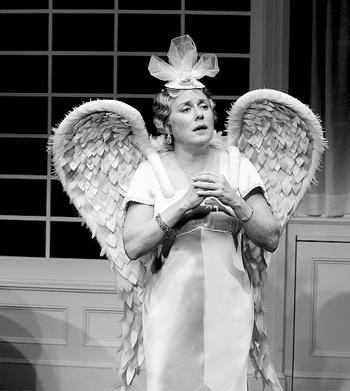Temperley’s “Souvenir” movingly explores a demented diva and her era
If you have ever heard Florence Foster Jenkins’ singing on recordings—off-pitch, often toneless, and ungifted at languages, like an elderly Yma Sumac impersonator channeling William Hung—you probably wonder why anyone would wish to stage a musical play about this highly dubious musical performer, who died in 1944.
Stephen Temperley’s theatrical must-see “Souvenir” answers those concerns brilliantly.
The British-born actor and author has evidently been shaping and reworking this piece—part fact, part “fantasia”—for many years. The enterprising York Theatre workshopped the show in something approaching its current incarnation but entitled “Musicale” in May 2003, with Vivian Matalon drawing out wonderful performances from his two-person cast: Jack Lee, whose program bio and expert timing make clear that he’s done everything and worked with everyone in the American musical theater, as Jenkins’ long-suffering (or was it opportunistically enabling?) accompanist Cosme McMoon, and the always-working Broadway actress Alma Cuervo as “Madame Jenkins.”
Both were excellent, and the piece clearly merited the full staging Matalon has now given it.
Seeing that workshop, I wrote in these pages: “Temperley skillfully raises questions about the nature of artistic ambition and fulfillment through the pair’s interaction; and convincingly evokes a half-world passed down in generations of rumor, à la Hollinghurst’s ‘The Swimming Pool Library.’ McMoon’s gayness is taken for granted in his narrative of bars and smart dinner parties and bright-faced servicemen happening by Carnegie for tickets; playing both old and young, the charmingly irascible veteran music director Jack Lee was superb in timing and affect.”
In revising the show, Temperley has moved the locus of McMoon’s late night memorial reveries of Jenkins from an East Side fern bar in 1964 to a Greenwich Village supper club in 1969, thus pushing the aging pianist’s memories up against the changes in gay consciousness crystallized by the brave Stonewall Riots. The greater distance in time from his work with Jenkins, which was clearly the summit of his career, adds poignancy in terms of Cosme McMoon’s more advanced age, which frankly suits Lee’s aura of vulnerable toughness and—in the second act—his notable, and endearing, partial reliance on the script on his piano. As the revised title makes explicit, this is “a memory play,” as much about the process and act of remembering as about that remembered.
The “pastness” of the particular past that the Florence Foster Jenkins phenomenon represents is one of marginality—the intersection of “Bohemia,” gay subculture and elite clubwomen. The manner in which McMoon, in telling something of his own story to the audience, avoids concrete reference to the tenor of his personal life evokes the pre-war world detailed so skillfully in George Chauncey’s “Gay New York.” The aspiring pianist and songwriter, 23 when he came to the city, met Mme. Jenkins through her nephew, whom he “knew from… around.” “Roommates” are of indeterminate gender; friends are “musical.” The irrepressible Jenkins, too—as McMoon’s memory summons her up—has her own idiolect of French phrases, drawing room platitudes and sincere convictions about her art. Much to Temperley’s credit, there is scarce a line out of either character’s mouth which is not appropriate as to period and social class.
Florence Foster Jenkins, after years singing private hotel ballroom events for charity, eventually moved up to the then prestigious Town Hall and, inexorably, at age 76, to the hallowed stage of Carnegie on October 25, 1944, one month before her death.
Last year Cuervo, currently in “Beauty and the Beast,” was deeply moving in the part, and proved a very accomplished singer, as one needs to be in order to channel Mme. Jenkins’ hilariously lamentable efforts. An even more accomplished singer, Judy Kaye, now embodies this coloratura legend in her own mind. Kaye’s thoroughly impressive career has encompassed starring turns in musical comedy, “The New Music Theatre” (a term one MUST capitalize) and even roles sung “legit” in opera and operetta. Her proficiency has enabled the playwright to extend the musical demands of the role in the rehearsal and concert scenes.
Kaye is, as was Cuervo, by a considerable margin too young and attractive for the dowager’s part, but her youthful optimism becomes part of her characterization of Jenkins as a creature of childlike faith in her abilities and in the power of music. Kaye’s facial expressions alone are priceless. She and Lee work very well together and laughs often fill the theater, a sharp contrast to those moments when one character steps over a line and does something really shocking, eliciting gasps. And I heard more than a few sobs as these two terrific pros enact Temperley’s final coup de théâtre.
Matalon’s direction proves highly effective; David Budries’ sound design is unobtrusively right and Tracy Christiansen’s phenomenally apt gowns for Kaye are sheer perfection.
David Shengold (shengold@yahoo.com) writes about the arts for Time Out New York, Opera News and Playbill.


































